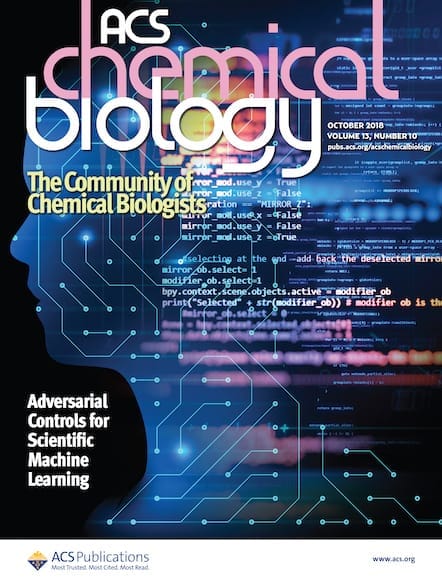This year’s Nobel Prize in Chemistry was awarded to Emmanuelle Charpentier and Jennifer A. Doudna for their development of the CRISPR/Cas9 method for genome editing. As C&EN notes, “CRISPR has been a boon for biologists who use the molecular scissors to probe the code of life in fundamental science experiments. But researchers have wasted no […]

This year’s Nobel Prize in Chemistry was awarded to Emmanuelle Charpentier and Jennifer A. Doudna for their development of the CRISPR/Cas9 method for genome editing.
As C&EN notes, “CRISPR has been a boon for biologists who use the molecular scissors to probe the code of life in fundamental science experiments. But researchers have wasted no time in applying the tool to agriculture and human health. Several groups are using CRISPR to change the DNA of livestock and crops. Others are using CRISPR as the basis of one-time therapies that could potentially offer cures to genetic diseases like sickle cell disease and muscular dystrophy. CRISPR has even been used to make simple diagnostic tests during the coronavirus pandemic.”
“Today’s Nobel Prize in Chemistry recognizes CRISPR-Cas9, a super-selective and precise gene-editing tool where chemistry plays an incredibly important role,” said ACS President Luis Echegoyen. “This discovery, originally derived from a natural defense mechanism in bacteria against viruses, will have untold applications in treating and curing genetic diseases and fighting cancer, as well as impacts on agricultural and other areas. The future for this technique is indeed bright and promising.”
Emmanuelle Charpentier is the Founding, Scientific and Managing Director of the Max Planck Unit for the Science of Pathogens in Berlin.
Jennifer A. Doudna is the Li Ka Shing Chancellor’s Professor of Biomedical Science, Chair of the Chancellor’s Advisor Committee on Biology and the Executive Director of the Innovative Genomics Initiative at the University of California, Berkeley. She is also an Investigator at the Howard Hughes Medical Institute. She is a former Associate Editor of ACS Chemical Biology and a current member of the journal’s Editorial Advisory Board.
“We congratulate Jennifer Doudna and Emmanuelle Charpentier on their groundbreaking Nobel Prize. The powerful gene-editing tools that resulted from their studies of the CRISPR/Cas9 bacterial defense system emerged from their application of chemical and mechanistic logic. The CRISPR-based tools are modular—a fundamental principle rooted in chemical biology,” said ACS Chemical Biology Editor-in-Chief Laura L Kiessling.
This year marks the first time the prize has been jointly awarded to two women. Charpentier and Doudna are just the sixth and seventh women to ever receive the prize.
“This Nobel Prize being awarded to two women has not escaped the notice of aspiring young female scientists. I have first-hand evidence as my daughter sent me an excited text this morning,” Kiessling added.
Read a conversation between ACS Chemical Biology Editor-in-Chief Laura Kiessling and Jennifer A. Doudna as they reflect on CRISPR, the field of chemical biology, and their experiences working in science.
The following research articles by Jennifer Doudna were published in ACS Central Science. Like all articles in that journal, they are published Open Access:
Site-Specific Bioconjugation through Enzyme-Catalyzed Tyrosine–Cysteine Bond Formation
Marco J. Lobba, Christof Fellmann, Alan M. Marmelstein, Johnathan C. Maza, Elijah N. Kissman, Stephanie A. Robinson, Brett T. Staahl, Cole Urnes, Rachel J. Lew, Casey S. Mogilevsky, Jennifer A. Doudna, and Matthew B. Francis
ACS Cent. Sci. 2020, 6, 9, 1564–1571
DOI: 10.1021/acscentsci.0c00940
***
Deciphering Off-Target Effects in CRISPR-Cas9 through Accelerated Molecular Dynamics
Clarisse G. Ricci, Janice S. Chen, Yinglong Miao, Martin Jinek, Jennifer A. Doudna, J. Andrew McCammon, and Giulia Palermo
ACS Cent. Sci. 2019, 5, 4, 651–662
DOI: acscentsci.9b00020
In honor of this year’s Nobel Prize in Chemistry winners, the following articles by Jennifer A. Doudna are being made free-to-read for 30 days (starting October 7, 2020) courtesy of ACS Publications:
Receptor-Mediated Delivery of CRISPR-Cas9 Endonuclease for Cell-Type-Specific Gene Editing
Romain Rouet, Benjamin A. Thuma, Marc D. Roy, Nathanael G. Lintner, David M. Rubitski, James E. Finley, Hanna M. Wisniewska, Rima Mendonsa, Ariana Hirsh, Lorena de Oñate, Joan Compte Barrón, Thomas J. McLellan, Justin Bellenger, Xidong Feng, Alison Varghese, Boris A. Chrunyk, Kris Borzilleri, Kevin D. Hesp, Kaihong Zhou, Nannan Ma, Meihua Tu, Robert Dullea, Kim F. McClure, Ross C. Wilson, Spiros Liras, Vincent Mascitti, and Jennifer A. Doudna
J. Am. Chem. Soc. 2018, 140, 21, 6596–6603
DOI: 10.1021/jacs.8b01551
***
Chemical and Biophysical Modulation of Cas9 for Tunable Genome Engineering
James K. Nuñez, Lucas B. Harrington, and Jennifer A. Doudna
ACS Chem. Biol. 2016, 11, 3, 681–688
DOI: 10.1021/acschembio.5b01019
***
